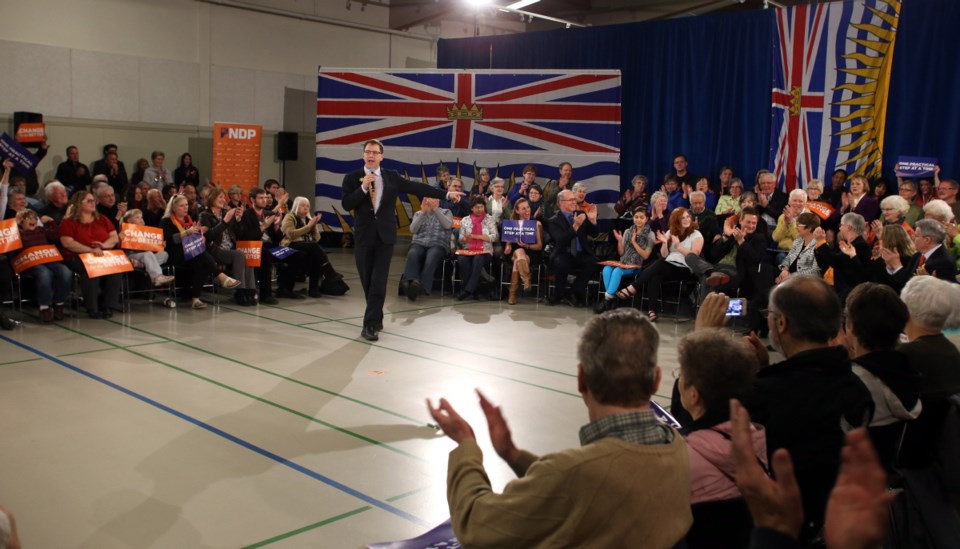NDP leader Adrian Dix promised Friday to reduce child poverty and inequality by boosting the B.C. family bonus program, raising income-assistance rates and strengthening services to adults with developmental disabilities.
Dix, who is under attack from the Liberals for over-spending, said an NDP government would inject $210 million a year into the bonus program beginning in 2014.
The sliding scale would give a single parent with one child and an income of $25,000 or less an extra $829 a year. The bonus would fall to $329 for those with an income of $50,000 and to zero by $66,000.
The NDP estimates that the money will lift 8,400 children out of poverty.
Read more election coverage HERE
Dix also promised to tie income-assistance rates to inflation, double earning exemptions for people trying to re-enter the workforce, and increase rates for all singles and couples by $20 a month within two years.
Carole James, who is seeking re-election as the NDP MLA in Victoria-Beacon Hill, said the proposals are part of a wide-ranging poverty-reduction strategy that will be introduced during the first session of the legislature if the NDP wins the May 14 election.
“We’ve committed to a legislated poverty-reduction plan with measurable targets and timelines and public reporting out each year,” she said. “These are the first steps to show people living in poverty that we are not waiting.”
The $20 increase for those on the lowest rate of assistance will not solve B.C.’s poverty problems, James admitted.
“But these are small, practical steps to get us there.”
Children’s Minister Stephanie Cadieux, who is seeking re-election in Surrey-Cloverdale, panned the NDP platform for spending millions on “vague” promises without explaining where the money will come from.
“It makes the difference between our parties and our platforms never more clear,” she said. “We have a plan to control our government spending and grow the economy and create jobs, and Adrian Dix’s plan is to spend money and spend lots of it.”
Cadieux also restated the Liberals’ long-standing position: “The best way for children to get out of poverty is for their parents to get out of poverty, and the best way for that is certainly a job.”
The NDP released its fiscal plan last week, saying it would pay for its campaign promises by increasing taxes on banks, corporations and high-income earners while reallocating money from “poor conceived” programs recently announced by he Liberals. The party said its poverty-reduction platform would cost $28 million this year and rise to $282 million by 2015-16.
The platform reflects many measures called for by non-profit agencies.
“I am pleased just to see it acknowledged as a significant issue, and I think some of this is meaningful,” said Kelly Newhook, executive director of the Together Against Poverty Society in Victoria.
One of the most life-changing proposals would be increasing the earning exemption for those on income assistance to $400 from $200 a month before it is clawed back, Newhook said.
“I am glad they are doing that right away,” she said. “It will really have an impact.”
In addition, a child-maintenance exemption of $100 a month would mean a parent on income assistance who receives child support from a former spouse would not have that money clawed back by government.
“We see that as ridiculous,” James said. “That is money a spouse is giving you to support a child.”
The NDP, meanwhile, said it would spend $18 million annually to hire more front-line staff in the Ministry of Children and Family Development and strengthen services to adults with developmental disabilities served by Community Living B.C.
Faith Bodnar, of the advocacy group Inclusion B.C., called the NDP proposals a modest beginning, and said her organization would continue to push for an external review of Community Living B.C.
“You can add money to something, but we also need to make sure the system is working,” Bodnar said. “I don’t think we’ve done that yet.
“Any party that makes government, they’re going to have to be much more bold in what they do.”



